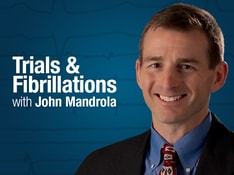Giving crushed prasugrel (Effient) to patients with ST-segment elevation myocardial infarction (STEMI) en route to a planned primary percutaneous coronary intervention (PCI) does not improve reperfusion rates, results of the COMPARE CRUSH trial show.
Patients assigned to prasugrel as crushed or integral tablets had similar rates of the study's co-primary endpoints of thrombolysis in myocardial infarction (TIMI) 3 flow in the infarct-related artery at first angiography (31% vs 32.7%; P = .64) and complete ST-segment resolution 1 hour post-PCI (59.9% vs 57.3%; P = .55).

Dr Georgios Vlachojannis
"These findings hold in spite of the fact that crushed tablets of prasugrel led to more potent platelet inhibition compared with integral tablets," said study author Georgios Vlachojannis, MD, PhD, University Medical Center Utrecht, the Netherlands.
"Whether faster and more potent antiplatelet therapy can improve coronary reperfusion in contemporary STEMI treatment regimen warrants further investigation."
The results were reported in a late-breaking clinical science session at TCT Connect, the virtual meeting of Transcatheter Cardiovascular Therapeutics (TCT) 2020, and published simultaneously in the journal Circulation.
Fibrinolytics and glycoprotein IIb/IIIa inhibitors have demonstrated improved coronary reperfusion and outcomes when given pre-hospital. Prior studies have also shown that early administration of a crushed P2Y12 inhibitor increases bioavailability and speeds platelet inhibition in STEMI patients, Vlachojannis noted.
However, the large randomized ATLANTIC trial, which compared pre-hospital to cath lab administration of crushed or integral ticagrelor (Brilinta), also found no difference in either TIMI flow in the infarct-related artery or ST-segment resolution.
Between November 2017 and March 2020, the investigator-initiated COMPARE CRUSH trial randomly allocated 727 STEMI patients (mean age, 62 years; 23% female) undergoing primary PCI to receive in the ambulance a 60 mg loading dose of prasugrel as either crushed or integral tablets.
The median time from onset of symptoms to first medical contact was 59 minutes, from first medical contact to study treatment 22 minutes, and from study treatment to primary PCI 57 minutes. These times did not differ between groups.
Platelet reactivity at the beginning of coronary angiography was significantly lower in the crushed group than in the integral group (P2Y12 reactivity units 192 vs 227; P < .01). This resulted in significantly fewer patients in the crushed group with high platelet reactivity, defined as P2Y12 reactivity units >208, prior to the start of PCI (43.3% vs 62.6%; P < .01).
There was no difference between the crushed and integral groups in the primary safety endpoint of TIMI major and BARC type 3 or higher bleeding within 48 hours after study treatment (0.4% vs 0.7%).
Death, MI, stroke, and urgent revascularization rates were also similar between groups during index hospitalization and at 30 days. Definite stent thrombosis occurred in one patient in the crushed group and two patients in the integral group.
In exploratory analysis, the co-primary endpoint results were consistent across multiple subgroups, although there was a trend toward greater benefit on TIMI 3 flow in the crushed tablet group in patients older than age 75 years (P for interaction = .04), presenting with anterior infarction (P for interaction = .03), or with a history of prior PCI (P for interaction < .01).
"However, these results should be regarded as hypothesis-generating," the authors write. "Opioids use in the ambulance was remarkably low in our study compared with the ATLANTIC trial, which might explain that we did not observe any significant interaction."
Notably, morphine was used in half the ATLANTIC patients and was thought to have possibly delayed the absorption of ticagrelor.
During discussion following the presentation, Sunil V. Rao, MD, Duke University Medical Center, Durham, North Carolina, asked, "Based on what you found, which is really no clinical advantage but no safety issue either, are you having your patients with ST-segment MI administering crushed prasugrel now?"
Vlachojannis said they didn't see any clinical impact but reiterated that high platelet reactivity was reduced by one third. "If this now translates into a safer primary PCI procedure, we can't say. The study wasn't powered for this kind of endpoint. Is this enough to give you a recommendation, Sunil, I'm not sure."
"What we know with COMPARE CRUSH, and this is important, is that we tried to give the medication as soon as possible and tried to give this medication in a formulation which has the most favorable pharmacodynamics profile, and we still see it's not doing the job," he added.
Fellow panelist Philippe Gabriel Steg, MD, Imperial College London, UK, questioned whether treatment time may play a role in teasing out the relatively modest differences that platelet reactivity may have on clinical outcomes.
Vlachojannis said the time from symptom onset to first medical contact was very fast and similar to that in the ATLANTIC trial. "The short time intervals have certainly influenced the outcomes."
Panelist Marco Valgimigli, MD, PhD, University Hospital Bern, Switzerland, followed up on the morphine issue, asking whether the investigators tested for an interaction between morphine or opioid use and platelet reactivity at the time of PCI.
"We haven’t looked into this but you probably have the ON-TIME 3 data in your mind when you're asking this, where crushed ticagrelor given in the ambulance didn't influence platelet reactivity at the time point of PCI," Vlachojannis said. "We are going to look further into the data and certainly the platelet reactivity analysis is going to be very interesting in this data set."
The study was an investigator-initiated trial sponsored by Maasstad Cardiovascular Research B.V. with unrestricted grants from Shanghai MicroPort Medical and Daiichi Sankyo. Vlachojannis declares receiving consulting fees from AstraZeneca, and research grants from Daiichi Sankyo and Shanghai MicroPort.
Circulation. Published October 14, 2020. Abstract
Follow Patrice Wendling on Twitter: @pwendl. For more from theheart.org | Medscape Cardiology, join us on Twitter and Facebook.
Medscape Medical News © 2020
Send news tips to news@medscape.net.
Cite this: COMPARE CRUSH: Crushed Prehospital Prasugrel Misses Mark in STEMI - Medscape - Oct 15, 2020.










Comments